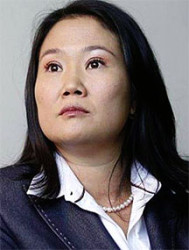LIMA, (Reuters) – Keiko Fujimori won the first round of Peru’s presidential election yesterday, though the race to be her opponent in the June run-off was locked in a virtual tie between two contenders, three exit polls showed.

Ipsos gave Fujimori 37.8 percent of valid votes, Pedro Pablo Kuczynski 20.9 percent, and Veronika Mendoza 20.3 percent. GfK had similar results, while CPI gave Kuczynski a slightly better advantage, with 19.7 percent to Mendoza’s 18.8 percent.
Fujimori, the daughter of imprisoned former President Alberto Fujimori, would have needed 50 percent for an outright win but was held back by critical voters who have not forgiven the authoritarian rule of her father.
Support for the U.S.-educated former congresswoman slipped after tens of thousands protested against her on April 5, 24 years after the elder Fujimori shut Congress with the support of the army. She may struggle to win a runoff vote.
Peruvians voted for President Ollanta Humala’s successor with their country of 30 million on track to become the world’s No. 2 copper producer. However, rising crime is a top concern for voters and many question why poverty persists with such vast mineral wealth.
Polls closed at 4p.m. (2100 GMT) Lima time. Partial results, about 20 percent or 30 percent of votes, will be given at 9 p.m. (0200 GMT) and the electoral body says it will finish counting on Monday.
A runoff between Kuczynski, a 77-year-old former World Bank economist, and Fujimori would likely ensure Peru’s free-market economic model remains intact. Mendoza’s late surge in opinion polls in recent weeks has spooked markets.
Fujimori has promised to build high-altitude prisons in the Andes to isolate dangerous criminals, and said she would drive economic growth forward at the end of a decade-long mining boom by tapping a rainy day fund and issuing new debt to fund badly needed infrastructure.
Kuczynski’s supporters danced in the streets with his guinea pig mascot after exit polls were reported. However, in previous elections early results have underrepresented rural areas, where Mendoza and Fujimori have stronger support.
The most recent Ipsos poll showed Kuczynski would beat Fujimori in a second-round election by seven points, while Mendoza was seen in a statistical tie with her. Fifty-one percent of Peruvians polled told Ipsos they would “definitely not” vote for her.
Kuczynski’s economic adviser, Alfredo Thorne, said that exit polls showed Kuczynski had stronger support in rural Peru than in 2011, when he struggled to connect with voters outside of Lima during his first presidential bid.
Mendoza, who wants to scrap Peru’s 1993 constitution and limit mining, thanked her supporters from her home city of Cuzco, once the capital of the Incan empire. “We’ve shown that we can do politics differently!” she said.
Fujimori has vowed to preserve democracy and extend 25 years of free-market policies.
Her father, a right-wing populist who is serving a 25-year prison term for human rights abuses and corruption during his 1990-2000 rule, is fondly remembered by some for building rural schools and hospitals and implementing neo-liberal reforms that remain in place. Keiko Fujimori famously became Peru’s first lady at 19 when her parents divorced.





